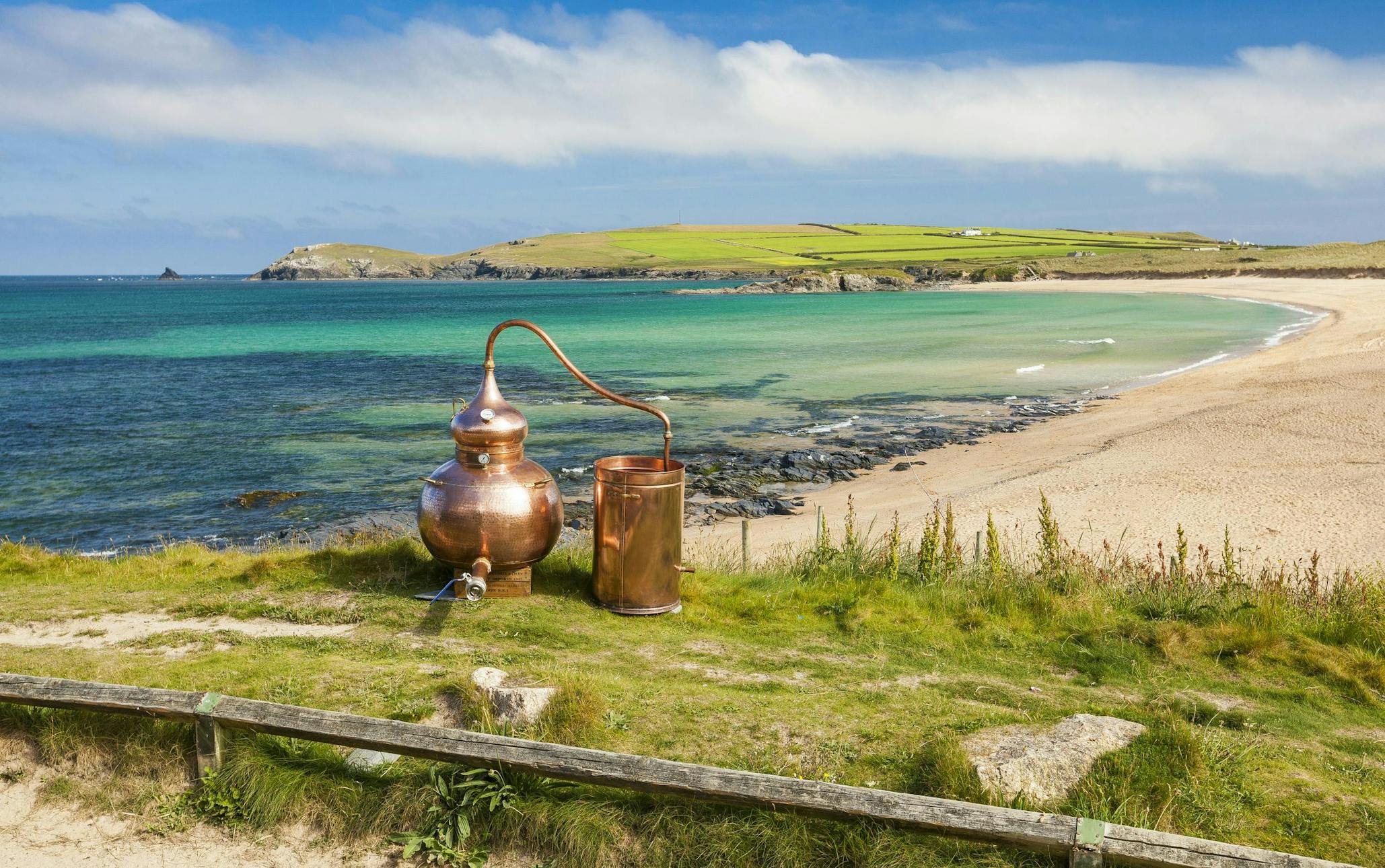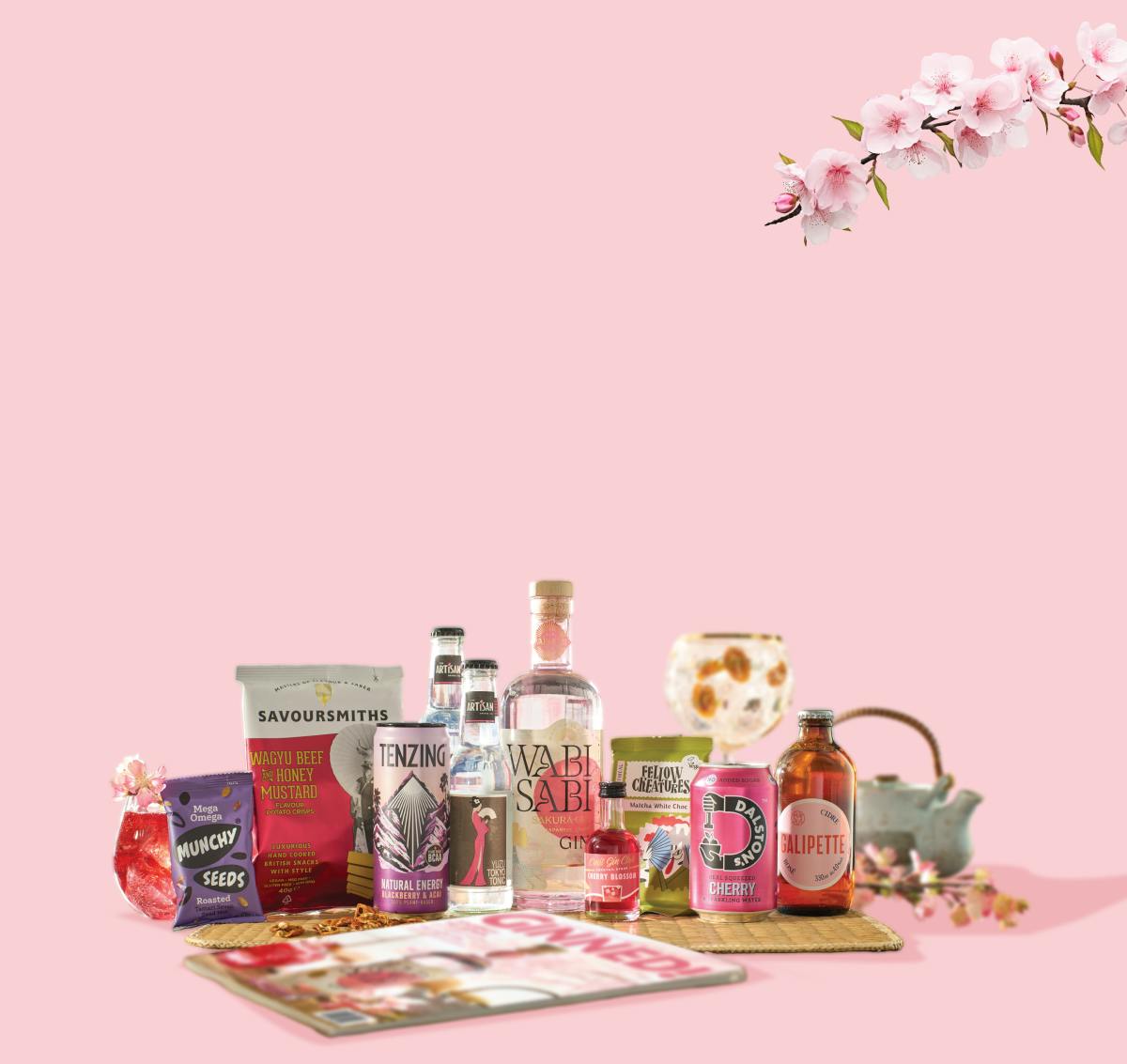
Tarquin's Gin: Spirit of Cornwall, Craft and Creativity
Talking to Tarquin Leadbetter about his award-winning spirits is a bit like talking to an artist about his work. For him, the creation of his spirits is a craft in the true sense of the word; something born of creativity, skill, learning and attention to detail; something that is carefully produced by hand from start to finish.
When you take a sip of any of Tarquin's Gins, including the Rosemary & Thyme Limited Edition that is our April Gin of the Month, you can taste the passion and care that has gone into making it on the wild north coast of Cornwall.
FIRST SKETCHES
Despite studying economics and politics at university, Tarquin had always known he wanted to work with food and drink. His degree was sandwiched between completing a Cordon Bleu cooking course, and a ski season spent cooking for a chalet in the French Alps. He then buckled down again to a desk job in London, writing political and financial market research about Latin American economies.
While he enjoyed the work and appreciated the chance to put his degree into practice, he couldn’t get rid of the hankering to be working with food and drink. He also wanted to work for himself and, as he puts it “do something more creative. I wasn’t particularly keen on spending the next 30 or 40 years behind a desk.”
And so he took the plunge, embarking on fulfilling his dream of setting up a restaurant in London – a would in fact turn out to be “a bit of a red herring.” After six months working on a business plan, he realised the plan wasn’t going to get off the ground for various reasons – not least the cost and difficulty of finding the right property in the capital.
Fortuitously, in those six months, he had also taken on a bar job, to keep himself going and to learn more about the industry. That job, which included wine and spirits training, turned out to be quite an eye opener. “While I’d focused on food before, I’d never had this grounding or entry into the world of drink.”
So when the restaurant dream failed to materialise, Tarquin instead took inspiration from the craft spirits movement, in which he had developed a keen interest and which was just beginning to gain some serious ground in the UK at the time.
Spirits had, up until then, traditionally been much more the domain of multinational companies. “Pretty much 90% of the back bar – or maybe even more – is controlled by about four companies,” he explains “maybe even fewer now actually, because there’s been consolidation in the multinational spirits market.”
But pioneers in the craft gin movement, such as Chase and Sipsmith, were becoming more widely known, showing that independent distillers could take on the big multinationals. For Tarquin, the success of these (at the time) smaller producers “opened up this world, so I could see that is was actually feasible for me to [make gin] on a small scale.”
“It was a really interesting proposition,” says Tarquin, “the idea of being able to make my own spirits starting out from scratch, having complete creative freedom and expression.” The botanical nature of gin provides a particularly fertile ground for creativity and experimentation. “A bit like a perfume, it gives you a sort of pure expression of flavour – and having the opportunity to put your completely unique stamp on a product, I thought was pretty amazing.”
PREPARING THE PALETTE
His mind made up, the next question was where to base himself. Having already discovered the economic constraints of starting up in London, Tarquin looked back to his roots: The West Country. “I’m actually from Devon,” he explains, “but I spent all my holidays at my grandparents’ house in Cornwall, the north coast of Cornwall by the sea.”
He laughingly admits that originally, “the idea was to go and make a few bottles of gin and go surfing in the afternoon – that was the dream! I suppose I was 23 or 24 and still quite naïve – naïve enough to think that was feasible.”
In fact, Tarquin was soon to discover that he had a big task in front of him – and that there was a lot to learn. For around the next 18 months he immersed himself in all things gin, going on “a creative journey of exploration.”
First of all, he rabidly consumed all the information he could find on gin and distilling from books to the internet, before gradually putting his studies into practice. He equipped himself with a small still, bulk-bought vodka from the cash and carry to serve as his neutral spirit base and as many botanicals as he could find from online spice retailers or from foraging locally. “Pretty much anything I could get my hands on, I’d soak it in the vodka and then distil it on this miniature still on my cooker.”
Working slowly and methodically, Tarquin distilled hundreds of batches – first distilling each fruit or botanical on its own, building up a kind of artist’s palette of tastes.
He started off with juniper, testing out different kinds from different regions to discern the subtle differences in flavour. He then moved on to “things which are in most traditional gin recipes but that one might never have actually tasted or smelled,” he explains.
“I was just learning. I didn’t know what orris root was, or angelica root – they were pretty much alien. So I wanted to build up a memory bank of smells and flavours to try to understand gin in its purest form.” After the classics came experiments with more unusual botanicals – things picked locally or that just seemed interesting.
It was during this extended period of experimentation that the idea of creating a Cornish pastis was also born. “When I got to things like aniseed, liquorice or star anise and distilled them on their own – well, they’re pretty much spirits in their own right, which reminded me of things like raki, ouzo, pastis and anisette. When I was in working France in the ski seasons, I drank lots of pastis out in the Alps – and then of course, the name also sounds like ‘Cornish pasties’!”
At the same time, Tarquin was centring in on what he wanted his gin recipe to be like. He knew that he wanted something “quite light, quite aromatic and balanced…something very enjoyable to drink, easy to drink, something that one would be happy just to drink over ice on its own – and that would obviously make a great G&T as well.”
So at the end of all his “weird and wacky” experiments, he ended up returning to traditional ingredients, aiming to use them in slightly different ways to create a more delicate, softer variation on a classic gin.
PAINTING WITH FLAVOUR
In practice, this means a passionate focus on the specific ingredients and their sources. So, after experimenting with many different junipers and realising that there is a big difference between terroirs, or regions, he conducted a blind tasting, ending up with a variety from Kosovo. “It has an amazing, almost like a cinnamon, ash wood kind of flavour, and it’s quite citrusy – it stood out for me as the one I wanted to use.”
While Tarquin’s Gin contains classic coriander – the second most popular gin ingredient – he uses only a small amount and a European variety, which is sweeter and less spicy in profile than the Moroccan variety. He also uses cinnamon instead of its more common, earthier (and cheaper) relation, cassia bark.
When it comes to citrus, another classic gin ingredient, Tarquin’s orange, lemon and grapefruit are all used fresh rather than the more typical dried peel. “It makes the gin brighter and more vibrant,” he explains, “you get that fresher citrus flavour coming in on the nose – it’s one of the first things you smell.”
As well as these modern interpretations of classic gin ingredients, Tarquin also wanted to add something a bit different, as well as something grounded in the local area. He went for violet leaves, which add a unique herbal note. “You don’t actually get the super-floral notes from the violets,” he tells us, “it’s more of a herbal, green tea-esque kind of flavour. But it adds a nice roundness to the citrusy and other floral notes and ties it all together.”
These carefully selected ingredients are combined with pure Cornish water, “some of the freshest water in England,” according to Tarquin “straight off the ocean. Cornwall’s the first dry land after a 3000-mile epic journey across the Atlantic. It’s quite a wild place – I like the idea of producing a fresh gin as a result of it.”
The first bottle of Tarquin’s Gin was bottled and sold in the summer of 2013 – the first bottle of pastis followed a month later – and it soon became clear that both were going to be a success. Indeed, just 12 months after that first batch, Tarquin’s Gin won gold at the prestigious International Wine and Spirits Competition (IWSC), one of only six gold-winning gins out of around 200 in the blind tasting.
The Southwestern Distillery team is slowly growing to keep up with increasing the pace of demand. Tarquin and his sister and co-founder Athene (originally an accountant by trade), are now joined by their parents, Joanna and Iain. Then there’s Marc who looks after southwest sales and events and Tom, who takes care of London-based sales and marketing (when he’s not taking photos or whipping up delicious Tarquin’s food recipes, like those featured on page 14.)
THE ART OF ‘CRAFT’
Even as things grow the way the spirits are made has remained resolutely the same from day one: it is produced by Tarquin himself; uses a one-shot method; is created small batches of around 240; and uses the original stills, Tamara and Senara (both named after local legends, which you can learn more about on page 12). These rustic, copper Portuguese stills of a type “used probably 1000 years ago in the farms of Portugal and North Africa,” need to be sealed with a flour dough every time they are used and are heated over direct flames from gas burners. The temperature is controlled manually, which may result in slightly different flavour profiles of the botanicals, depending on how the pot’s been heated.
The small-batch approach is important to Tarquin and representative of a whole philosophy centred on making by hand – investing care and attention to creating something that is unique. “While every batch is made of the same recipe,” he explains, “given the small nature of the production in any batch process, it’s never going to be homogenous or completely identical. It’s my way of celebrating the fact that it’s not mass produced and that we don’t make a million bottles of it at a time. So while it all tastes the same, there are still nuances between batches.”
For the limited edition Rosemary & Thyme version of his gin, created exclusively for April Craft Gin Club Members, Tarquin had to create 11 of these small batches. The gin is based on the original Tarquin’s recipe to which freshly-picked Cornish herbs are added.
“Our flagship gin is a floral citrusy gin, so I wanted to take a step in a different direction and make something little bit more herbal,” Tarquin tells us, “which would be really cool to make in cocktails and also in a G&T as well.
“It’s quite a different end of the gin spectrum to what we normally make, so it’s a nice complement to our original Tarquin’s Gin…you can see how a gin made in the same way can taste completely different, purely based on some small changes in the recipe.”
The care and attention invested in the production process is followed through in the packaging and design. Every bottle is hand filled, hand labelled and hand waxed. Each batch’s unique character tasting notes are also added to the bottles, which are then signed – usually by Tarquin’s mother Joanna as “she has the neatest handwriting.”
The result is a deliberately unique looking bottle, a direct challenge to ‘samey’, conventional mass-produced gins. “I wanted to make sure that people wouldn’t assume that we’re the same,” Tarquin explains.
The growing demand and critical acclaim for both Tarquin’s Gin and Cornish Pastis suggests the message is getting through. But while winning a gold medal was “cool”, and it’s good to get validation that the gin tastes good, Tarquin is most pleased that “it’s actually gone to plan.”
He reflects, “most businesses fail – that’s the reality, so have got to a point where things seem to have gone to plan, or even better than I expected, is still slightly amazing. I suppose two and a half years ago, I started so small, selling gin out of the boot of my car, and now there are six of us and it’s still growing. It’s pretty amazing to get to that point.”
So what’s next? Well, Southwestern Distillery recently launched a new Navy strength gin, The Seadog, and Tarquin is keen to work on new products and limited editions. He tells us “they’re a test of my craft – I’m still learning constantly as we go on. Being able to test out our recipe and push its boundaries is pretty exciting.”
We’re certainly excited to see what’s still to come from this passionate, young distiller – we’re sure whatever it is, it will be worth raising a glass to (and with).







